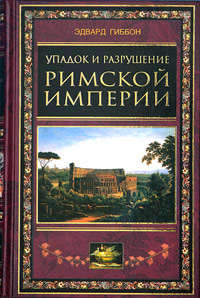
Полная версия
History of the Decline and Fall of the Roman Empire - Volume 2


Titel: History of the Decline and Fall of the Roman Empire — Volume 2
von Scott Hemphill, L. M. Montgomery, L. Frank Baum, John Milton, René Descartes, Baroness Emmuska Orczy Orczy, Karl Marx, Friedrich Engels, Edgar Rice Burroughs, Unknown, Norman F. Joly, Norman Coombs, David Slowinski, Mark Twain, Henry David Thoreau, Stephen Crane, John Goodwin, Nathaniel Hawthorne, Winn Schwartau, Odd De Presno, Sir Walter Scott, Jules Verne, Mary Wollstonecraft Shelley, United States. Central Intelligence Agency, United States, Canada, Willa Sibert Cather, Anthony Hope, Edwin Abbott Abbott, Charles Dickens, Frederick Douglass, William Shakespeare, Bruce Sterling, Franklin Delano Roosevelt, Jane Austen, Thomas Hardy, Sir Arthur Conan Doyle, Edna St. Vincent Millay, Gene Stratton-Porter, Richard McGowan, Frances Hodgson Burnett, United States. Bureau of the Census, Electronic Frontier Foundation, Robert Louis Stevenson, Anonymous, Jerry Bonnell, Robert Nemiroff, Andrew Lang, G. K. Chesterton, John Bunyan, Sunzi 6th cent. B.C., Harold Frederic, Mary Wollstonecraft, Victor Hugo, René Doumic, Upton Sinclair, Virginia Woolf, George Eliot, Thomas Paine, Benjamin Franklin, Plato, Samuel Taylor Coleridge, Ruth M. Sprague, William Dean Howells, Wilkie Collins, Jean Webster, H. G. Wells, Kate Chopin, Mark Eliot Laxer, Louisa May Alcott, Frank Norris, Edith Wharton, S. D. Humphrey, Henry Hunt Snelling, William Morris, Mrs. Susanna Rowson, Christopher Morley, Sax Rohmer, Oscar Wilde, Gaston Leroux, Henry James, Project Gutenberg, Harriet Beecher Stowe, Various, Robert W. Service, A. B. Paterson, Henry Lawson, Jack London, Laozi, D. H. Lawrence, Julius Caesar, Joseph Conrad, W. Somerset Maugham, George MacDonald, Marcus Tullius Cicero, Virgil, Theodore Dreiser, Giuseppe Salza, Rudyard Kipling, ca. 50 BCE-16 BCE Sextus Propertius, Robert A. Harris, William Wells Brown, graf Leo Tolstoy, Omar Khayyám, Michael Hart, Library of Congress. Copyright Office, Coalition for Networked Information, Geoffrey Chaucer, Adam Lindsay Gordon, Hiram Corson, Robert Browning, Amy Lowell, Rupert Brooke, Joyce Kilmer, John Gower, Saki, Kenneth Grahame, Anna Sewell, Martin Luther, Philipp Melanchthon, National Atomic Museum, Alexander William Kinglake, Charles John Cutcliffe Wright Hyne, Amelia Edith Huddleston Barr, James Branch Cabell, Bayard Taylor, Horatio Alger, Booth Tarkington, Hjalmar Hjorth Boyesen, Michael Husted, Émile Gaboriau, Jerome K. Jerome, Stephen Vincent Benét, Edwin Arlington Robinson, J. Frank Dobie, Joseph Rodman Drake, Eliot Gregory, John Fox, John Muir, Richard Harding Davis, Edgar A. Guest, Mary Roberts Rinehart, Thomas Nelson Page, Sir Walter Alexander Raleigh, Rebecca Harding Davis, Charles Alexander Eastman, Zitkala-Sa, Marie L. McLaughlin, J. M. Barrie, Bram Stoker, Hesiod, Edna Ferber, John McCrae, Anna Howard Shaw, Elizabeth Garver Jordan, Frances Jenkins Olcott, P.-J. Proudhon, Eleanor H. Porter, Mary Hunter Austin, Sarah Orne Jewett, Russell Herman Conwell, Daniel Defoe, Henry Benjamin Wheatley, Ambrose Bierce, Nettie Garmer Barker, Martí Joan de Galba, Joanot Martorell, Oliver Goldsmith, Zane Grey, Winston Churchill, Arthur Machen, L. Cranmer-Byng, Torquato Tasso, H. De Vere Stacpoole, Elizabeth Cleghorn Gaskell, Frank Richard Stockton, Rutherford Hayes Platt, Sara Teasdale, Samuel Smiles, W. E. B. Du Bois, Phillis Wheatley, Elbert Hubbard, Richard Jefferies, George Henry Borrow, Sherwood Anderson, Vachel Lindsay, David Graham Phillips, Harry Houdini, Eugene Field, Gustave Le Bon, Henry Brodribb Irving, William Healy, Mary Tenney Healy, Charles Godfrey Leland, Ralph Parlette, Don Marquis, Richard Le Gallienne, Stewart Edward White, Andrew Steinmetz, Madame de La Fayette, Abbé Prévost, Honoré de Balzac, Charles W. Chesnutt, Sara Cone Bryant, William Booth, James Nasmyth, Enrico Ferri, Joe Hutsko, Miriam Michelson, Oliver Optic, Victor MacClure, Calamity Jane, Gertrude Franklin Horn Atherton, Dinah Maria Mulock Craik, Henry J. Coke, Kate Douglas Smith Wiggin, Victor [pseud.] Appleton, Carlo Collodi, Hugh Lofting, John Philip Sousa, Andrew Dickson White, Joseph Sheridan Le Fanu, Isaac Taylor Headland, Amy Steedman, B. M. Bower, William Tuckwell, Clarence Edgar Johnson, Sinclair Lewis, Rex Stout, Carl R. Maag, Steve Rohrer, Mariano Azuela, Royall Tyler, John Buchan, Ross Kay, J. L. Kennon, Eros Urides, Friedrich Schiller, William Cowper Brann, Adelaide L. Fries, Beatrix Potter, Mary Lamb, Charles Lamb, William Blake, Francis Bacon, Samuel Johnson, Tadashi Nakashima, Sidney Lanier, Edward Jenkins, Harriet E. Wilson, Ellen Craft, William Craft, Sir Thomas Browne, Alexander H. Japp, Guy de Maupassant, Thomas Bailey Aldrich, Snorri Sturluson, William Makepeace Thackeray, Fyodor Dostoyevsky, M. G. Lewis, Lucan, Edwin Lester Linden Arnold, Frank Bird Linderman, Tingfang Wu, Baron Alfred Tennyson Tennyson, Japan, Lodovico Ariosto, Alan Seeger, Anthony Trollope, Lewis Carroll, William James, Jonathan Swift, Edward Bellamy, Richard de Bury, Charles Mackay, Eliza Burt Gamble, R. M. Ballantyne, Fanny Van de Grift Stevenson, Mrs. Sutherland Orr, William Sharp, 4th century Smyrnaeus Quintus, Noah Webster, Russ Walter, Plutarch, Charles Kingsley, Frances Ellen Watkins Harper, Sarojini Naidu, Maksim Gorky, Greg Fee, Izaak Walton, U.S. Arms Control and Disarmament Agency, United States. Army. Corps of Engineers. Manhattan District, European Union, Alice Moore Dunbar-Nelson, Bertrand Russell, James Whitcomb Riley, S. Weir Mitchell, Horace Walpole, John Ruskin, Martha Young, Richard Lovelace, Henry Van Dyke, Michael Fairless, E. W. Hornung, Henry Rider Haggard, Edward Sylvester Ellis, Laura Lee Hope, Lafcadio Hearn, William Ernest Henley, John Clark Ridpath, G. Mercer Adam, Charles Keyser Edmunds, John A. Carpenter, Steven Levy, Edward Gibbon, Henry Clay, John C. Calhoun, Thomas Hart Benton, Arthur Brisbane, William Godwin, Walter L. Pyle, George M. Gould, Dornford Yates, Saint John of Damascus, Oliver Wendell Holmes, Hendrik Willem Van Loon, Isabella L. Bird, J. A. Munk, Sir W. S. Gilbert, Sir Max Beerbohm, George Whale, Edmund Day, Marion Mills Miller, John Murray, Mary Mapes Dodge, Abraham Merritt, Anne Brontë, Emily Brontë, Kakuzo Okakura, E. Nesbit, Charlotte Brontë, William J. Claxton, Christopher Marlowe, Sir John Mandeville, Jos. E. Badger, Titus Lucretius Carus, Charles Brockden Brown, Frederick Arthur Ambrose Talbot, Stendhal, Laurence Sterne, F. Scott Fitzgerald, Sophocles, Sir Arthur Sullivan, Graf Ilia Lvovich Tolstoi, Alexis de Tocqueville, H. Barber, Herbert Newton Casson, Frank Lewis Dyer, Thomas Commerford Martin, Frank Tymon, ca. 3rd cent. B.C. Apollonius Rhodius, 12th cent. de Troyes Chrétien, J. Walker McSpadden, Thorstein Veblen, R. D. Blackmore, William Gilmore Simms, Henry Timrod, M. L. Weems, Baron Thomas Babington Macaulay Macaulay, Francis Hopkinson Smith, Mary White Rowlandson, John Dewey, Margaret Mayo, John Mackenzie Bacon, Owen Wister, Agatha Christie, Epictetus, Evelyn Charles Vivian, W. Lockwood Marsh, Washington Irving, John Greenleaf Whittier, James Russell Lowell, Elizabeth Stoddard, Lady Lucie Duff Gordon, Princess Der Ling
ISBN 978-3-7429-0840-7
Alle Rechte vorbehalten.
Es ist ohne vorherige schriftliche Erlaubnis nicht gestattet, dieses Werk im Ganzen oder in Teilen zu vervielfältigen oder zu veröffentlichen.
HISTORY OF THE DECLINE AND FALL OF THE ROMAN EMPIRE, VOLUME 2
Edward Gibbon, Esq.
With notes by the Rev. H. H. Milman
1782 (Written), 1845 (Revised)
CONTENTS:
Chapter XVI—Conduct Towards The Christians, From Nero To Constantine.—Part I. Part II. Part III. Part IV. Part V. Part VI. Part VII. Part VIII. Chapter XVII: Foundation Of Constantinople.—Part I. Part II. Part III. Part IV. Part V. Part VI. Chapter XVIII: Character Of Constantine And His Sons.—Part I. Part II. Part III. Part IV. Chapter XIX: Constantius Sole Emperor.—Part I. PartII. Part III. Part IV. Chapter XX: Conversion Of Constantine.—Part I. Part II. Part III. PartIV. Chapter XXI: Persecution Of Heresy, State Of The Church.—Part I. Part II. Part III. Part IV. Part V. Part VI. Part VII. Chapter XXII: Julian Declared Emperor.—Part I Part II. Part III. Part IV. Chapter XXIII: Reign Of Julian.—Part I. Part II. Part III. Part IV. Part V. Chapter XXIV: The Retreat And Death Of Julian.—Part I. Part II. Part III. Part IV. Part V. Chapter XXV: Reigns Of Jovian And Valentinian, Division Of The Empire.—Part I. Part II. Part III. Part IV. Part V. Part VI. Part VII. Chapter XXVI: Progress of The Huns.—Part I. Part II. Part III. Part IV. Part V.
Chapter XVI—Conduct Towards The Christians, From Nero To Constantine.—Part I.
If we seriously consider the purity of the Christian religion, the sanctity of its moral precepts, and the innocent as well as austere lives of the greater number of those who during the first ages embraced the faith of the gospel, we should naturally suppose, that so benevolent a doctrine would have been received with due reverence, even by the unbelieving world; that the learned and the polite, however they may deride the miracles, would have esteemed the virtues, of the new sect; and that the magistrates, instead of persecuting, would have protected an order of men who yielded the most passive obedience to the laws, though they declined the active cares of war and government. If, on the other hand, we recollect the universal toleration of Polytheism, as it was invariably maintained by the faith of the people, the incredulity of philosophers, and the policy of the Roman senate and emperors, we are at a loss to discover what new offence the Christians had committed, what new provocation could exasperate the mild indifference of antiquity, and what new motives could urge the Roman princes, who beheld without concern a thousand forms of religion subsisting in peace under their gentle sway, to inflict a severe punishment on any part of their subjects, who had chosen for themselves a singular but an inoffensive mode of faith and worship.
The religious policy of the ancient world seems to have assumed a more stern and intolerant character, to oppose the progress of Christianity. About fourscore years after the death of Christ, his innocent disciples were punished with death by the sentence of a proconsul of the most amiable and philosophic character, and according to the laws of an emperor distinguished by the wisdom and justice of his general administration. The apologies which were repeatedly addressed to the successors of Trajan are filled with the most pathetic complaints, that the Christians, who obeyed the dictates, and solicited the liberty, of conscience, were alone, among all the subjects of the Roman empire, excluded from the common benefits of their auspicious government. The deaths of a few eminent martyrs have been recorded with care; and from the time that Christianity was invested with the supreme power, the governors of the church have been no less diligently employed in displaying the cruelty, than in imitating the conduct, of their Pagan adversaries. To separate (if it be possible) a few authentic as well as interesting facts from an undigested mass of fiction and error, and to relate, in a clear and rational manner, the causes, the extent, the duration, and the most important circumstances of the persecutions to which the first Christians were exposed, is the design of the present chapter. *
The sectaries of a persecuted religion, depressed by fear animated with resentment, and perhaps heated by enthusiasm, are seldom in a proper temper of mind calmly to investigate, or candidly to appreciate, the motives of their enemies, which often escape the impartial and discerning view even of those who are placed at a secure distance from the flames of persecution. A reason has been assigned for the conduct of the emperors towards the primitive Christians, which may appear the more specious and probable as it is drawn from the acknowledged genius of Polytheism. It has already been observed, that the religious concord of the world was principally supported by the implicit assent and reverence which the nations of antiquity expressed for their respective traditions and ceremonies. It might therefore be expected, that they would unite with indignation against any sect or people which should separate itself from the communion of mankind, and claiming the exclusive possession of divine knowledge, should disdain every form of worship, except its own, as impious and idolatrous. The rights of toleration were held by mutual indulgence: they were justly forfeited by a refusal of the accustomed tribute. As the payment of this tribute was inflexibly refused by the Jews, and by them alone, the consideration of the treatment which they experienced from the Roman magistrates, will serve to explain how far these speculations are justified by facts, and will lead us to discover the true causes of the persecution of Christianity.
Without repeating what has already been mentioned of the reverence of the Roman princes and governors for the temple of Jerusalem, we shall only observe, that the destruction of the temple and city was accompanied and followed by every circumstance that could exasperate the minds of the conquerors, and authorize religious persecution by the most specious arguments of political justice and the public safety. From the reign of Nero to that of Antoninus Pius, the Jews discovered a fierce impatience of the dominion of Rome, which repeatedly broke out in the most furious massacres and insurrections. Humanity is shocked at the recital of the horrid cruelties which they committed in the cities of Egypt, of Cyprus, and of Cyrene, where they dwelt in treacherous friendship with the unsuspecting natives; and we are tempted to applaud the severe retaliation which was exercised by the arms of the legions against a race of fanatics, whose dire and credulous superstition seemed to render them the implacable enemies not only of the Roman government, but of human kind. The enthusiasm of the Jews was supported by the opinion, that it was unlawful for them to pay taxes to an idolatrous master; and by the flattering promise which they derived from their ancient oracles, that a conquering Messiah would soon arise, destined to break their fetters, and to invest the favorites of heaven with the empire of the earth. It was by announcing himself as their long-expected deliverer, and by calling on all the descendants of Abraham to assert the hope of Isræl, that the famous Barchochebas collected a formidable army, with which he resisted during two years the power of the emperor Hadrian.
Notwithstanding these repeated provocations, the resentment of the Roman princes expired after the victory; nor were their apprehensions continued beyond the period of war and danger. By the general indulgence of polytheism, and by the mild temper of Antoninus Pius, the Jews were restored to their ancient privileges, and once more obtained the permission of circumcising their children, with the easy restraint, that they should never confer on any foreign proselyte that distinguishing mark of the Hebrew race. The numerous remains of that people, though they were still excluded from the precincts of Jerusalem, were permitted to form and to maintain considerable establishments both in Italy and in the provinces, to acquire the freedom of Rome, to enjoy municipal honors, and to obtain at the same time an exemption from the burdensome and expensive offices of society. The moderation or the contempt of the Romans gave a legal sanction to the form of ecclesiastical police which was instituted by the vanquished sect. The patriarch, who had fixed his residence at Tiberias, was empowered to appoint his subordinate ministers and apostles, to exercise a domestic jurisdiction, and to receive from his dispersed brethren an annual contribution. New synagogues were frequently erected in the principal cities of the empire; and the sabbaths, the fasts, and the festivals, which were either commanded by the Mosaic law, or enjoined by the traditions of the Rabbis, were celebrated in the most solemn and public manner. Such gentle treatment insensibly assuaged the stern temper of the Jews. Awakened from their dream of prophecy and conquest, they assumed the behavior of peaceable and industrious subjects. Their irreconcilable hatred of mankind, instead of flaming out in acts of blood and violence, evaporated in less dangerous gratifications. They embraced every opportunity of overreaching the idolaters in trade; and they pronounced secret and ambiguous imprecations against the haughty kingdom of Edom.
Since the Jews, who rejected with abhorrence the deities adored by their sovereign and by their fellow-subjects, enjoyed, however, the free exercise of their unsocial religion, there must have existed some other cause, which exposed the disciples of Christ to those severities from which the posterity of Abraham was exempt. The difference between them is simple and obvious; but, according to the sentiments of antiquity, it was of the highest importance. The Jews were a nation; the Christians were a sect: and if it was natural for every community to respect the sacred institutions of their neighbors, it was incumbent on them to persevere in those of their ancestors. The voice of oracles, the precepts of philosophers, and the authority of the laws, unanimously enforced this national obligation. By their lofty claim of superior sanctity the Jews might provoke the Polytheists to consider them as an odious and impure race. By disdaining the intercourse of other nations, they might deserve their contempt. The laws of Moses might be for the most part frivolous or absurd; yet, since they had been received during many ages by a large society, his followers were justified by the example of mankind; and it was universally acknowledged, that they had a right to practise what it would have been criminal in them to neglect. But this principle, which protected the Jewish synagogue, afforded not any favor or security to the primitive church. By embracing the faith of the gospel, the Christians incurred the supposed guilt of an unnatural and unpardonable offence. They dissolved the sacred ties of custom and education, violated the religious institutions of their country, and presumptuously despised whatever their fathers had believed as true, or had reverenced as sacred. Nor was this apostasy (if we may use the expression) merely of a partial or local kind; since the pious deserter who withdrew himself from the temples of Egypt or Syria, would equally disdain to seek an asylum in those of Athens or Carthage. Every Christian rejected with contempt the superstitions of his family, his city, and his province. The whole body of Christians unanimously refused to hold any communion with the gods of Rome, of the empire, and of mankind. It was in vain that the oppressed believer asserted the inalienable rights of conscience and private judgment. Though his situation might excite the pity, his arguments could never reach the understanding, either of the philosophic or of the believing part of the Pagan world. To their apprehensions, it was no less a matter of surprise, that any individuals should entertain scruples against complying with the established mode of worship, than if they had conceived a sudden abhorrence to the manners, the dress, or the language of their native country. *
The surprise of the Pagans was soon succeeded by resentment; and the most pious of men were exposed to the unjust but dangerous imputation of impiety. Malice and prejudice concurred in representing the Christians as a society of atheists, who, by the most daring attack on the religious constitution of the empire, had merited the severest animadversion of the civil magistrate. They had separated themselves (they gloried in the confession) from every mode of superstition which was received in any part of the globe by the various temper of polytheism: but it was not altogether so evident what deity, or what form of worship, they had substituted to the gods and temples of antiquity. The pure and sublime idea which they entertained of the Supreme Being escaped the gross conception of the Pagan multitude, who were at a loss to discover a spiritual and solitary God, that was neither represented under any corporeal figure or visible symbol, nor was adored with the accustomed pomp of libations and festivals, of altars and sacrifices. The sages of Greece and Rome, who had elevated their minds to the contemplation of the existence and attributes of the First Cause, were induced by reason or by vanity to reserve for themselves and their chosen disciples the privilege of this philosophical devotion. They were far from admitting the prejudices of mankind as the standard of truth, but they considered them as flowing from the original disposition of human nature; and they supposed that any popular mode of faith and worship which presumed to disclaim the assistance of the senses, would, in proportion as it receded from superstition, find itself incapable of restraining the wanderings of the fancy, and the visions of fanaticism. The careless glance which men of wit and learning condescended to cast on the Christian revelation, served only to confirm their hasty opinion, and to persuade them that the principle, which they might have revered, of the Divine Unity, was defaced by the wild enthusiasm, and annihilated by the airy speculations, of the new sectaries. The author of a celebrated dialogue, which has been attributed to Lucian, whilst he affects to treat the mysterious subject of the Trinity in a style of ridicule and contempt, betrays his own ignorance of the weakness of human reason, and of the inscrutable nature of the divine perfections.
It might appear less surprising, that the founder of Christianity should not only be revered by his disciples as a sage and a prophet, but that he should be adored as a God. The Polytheists were disposed to adopt every article of faith, which seemed to offer any resemblance, however distant or imperfect, with the popular mythology; and the legends of Bacchus, of Hercules, and of Æsculapius, had, in some measure, prepared their imagination for the appearance of the Son of God under a human form. But they were astonished that the Christians should abandon the temples of those ancient heroes, who, in the infancy of the world, had invented arts, instituted laws, and vanquished the tyrants or monsters who infested the earth, in order to choose for the exclusive object of their religious worship an obscure teacher, who, in a recent age, and among a barbarous people, had fallen a sacrifice either to the malice of his own countrymen, or to the jealousy of the Roman government. The Pagan multitude, reserving their gratitude for temporal benefits alone, rejected the inestimable present of life and immortality, which was offered to mankind by Jesus of Nazareth. His mild constancy in the midst of cruel and voluntary sufferings, his universal benevolence, and the sublime simplicity of his actions and character, were insufficient, in the opinion of those carnal men, to compensate for the want of fame, of empire, and of success; and whilst they refused to acknowledge his stupendous triumph over the powers of darkness and of the grave, they misrepresented, or they insulted, the equivocal birth, wandering life, and ignominious death, of the divine Author of Christianity.
The personal guilt which every Christian had contracted, in thus preferring his private sentiment to the national religion, was aggravated in a very high degree by the number and union of the criminals. It is well known, and has been already observed, that Roman policy viewed with the utmost jealousy and distrust any association among its subjects; and that the privileges of private corporations, though formed for the most harmless or beneficial purposes, were bestowed with a very sparing hand. The religious assemblies of the Christians who had separated themselves from the public worship, appeared of a much less innocent nature; they were illegal in their principle, and in their consequences might become dangerous; nor were the emperors conscious that they violated the laws of justice, when, for the peace of society, they prohibited those secret and sometimes nocturnal meetings. The pious disobedience of the Christians made their conduct, or perhaps their designs, appear in a much more serious and criminal light; and the Roman princes, who might perhaps have suffered themselves to be disarmed by a ready submission, deeming their honor concerned in the execution of their commands, sometimes attempted, by rigorous punishments, to subdue this independent spirit, which boldly acknowledged an authority superior to that of the magistrate. The extent and duration of this spiritual conspiracy seemed to render it everyday more deserving of his animadversion. We have already seen that the active and successful zeal of the Christians had insensibly diffused them through every province and almost every city of the empire. The new converts seemed to renounce their family and country, that they might connect themselves in an indissoluble band of union with a peculiar society, which every where assumed a different character from the rest of mankind. Their gloomy and austere aspect, their abhorrence of the common business and pleasures of life, and their frequent predictions of impending calamities, inspired the Pagans with the apprehension of some danger, which would arise from the new sect, the more alarming as it was the more obscure. "Whatever," says Pliny, "may be the principle of their conduct, their inflexible obstinacy appeared deserving of punishment."









